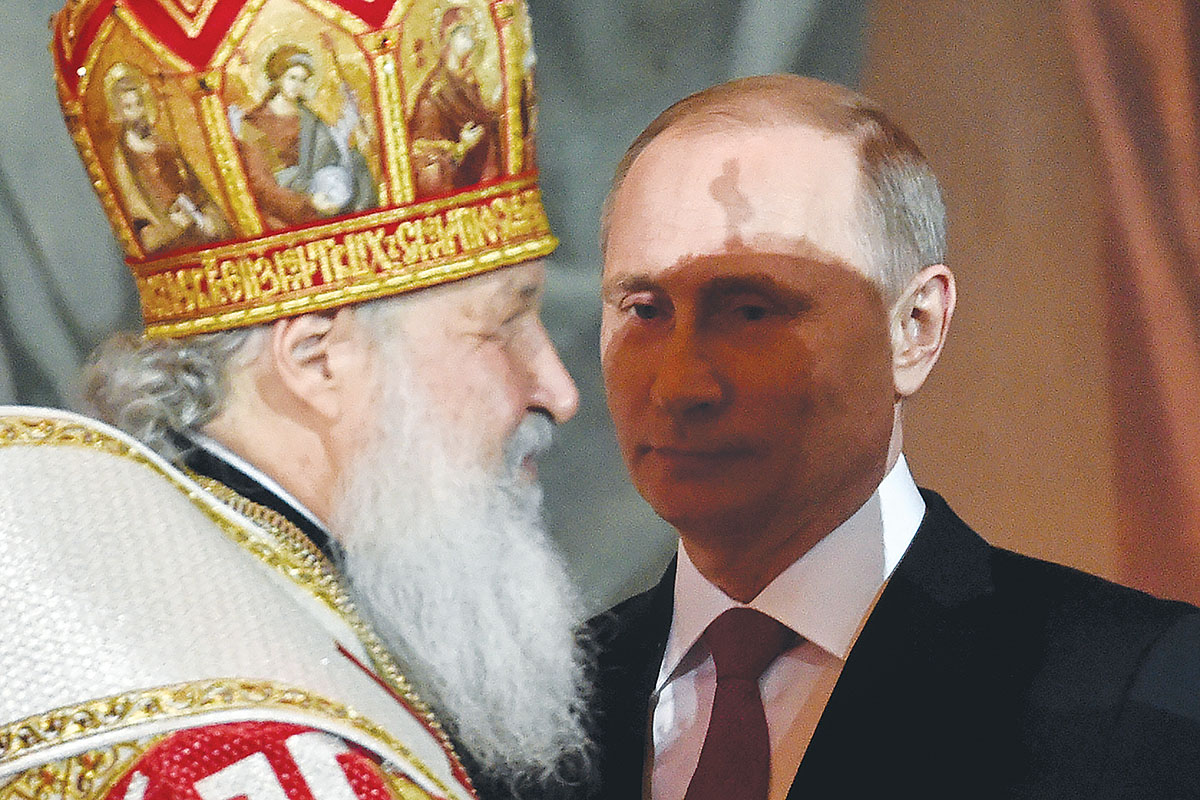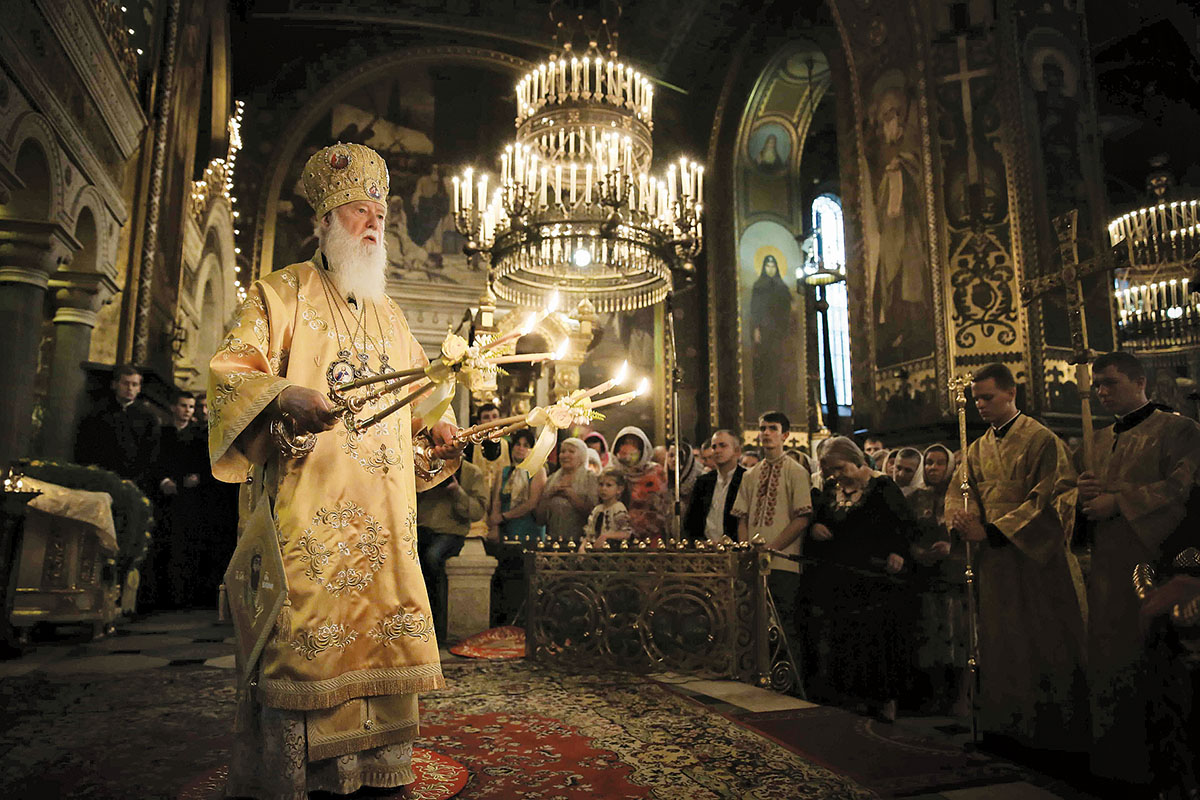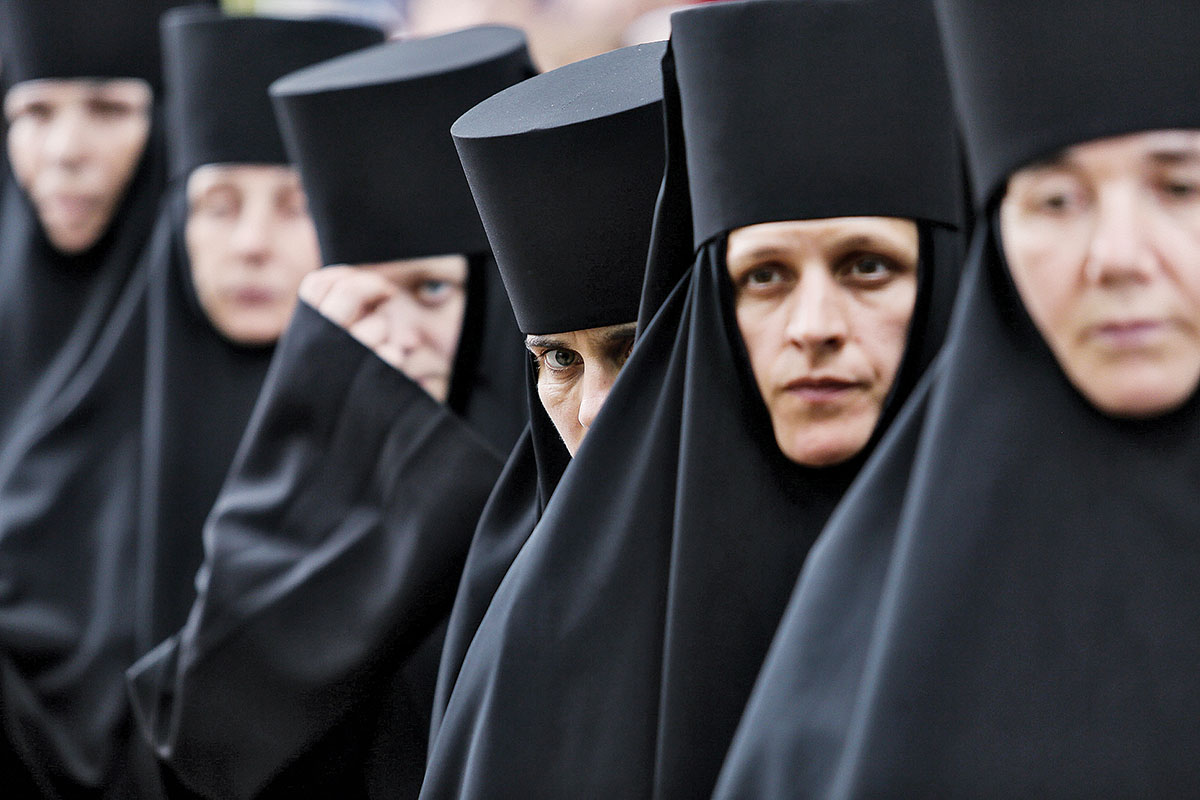Editor’s Note: This is the ninth story in the Kyiv Post’s Honest History series that aims to debunk myths about Ukrainian history. The series is supported by the Black Sea Trust, a project of the German Marshall Fund of the United States. Opinions expressed do not necessarily represent those of the Black Sea Trust, the German Marshall Fund or its partners.
For Archpriest Serhiy Dmytriyev it was a question of dignity, more than faith. In the summer of 2014, Dmytriyev and the congregation of St. Barbara Church in Kherson, a city of 293,000 people 547 kilometers south of Kyiv, switched allegiance to the Kyiv Patriarchate.
It wasn’t a spontaneous decision.
During his numerous trips to the war-torn Donbas, where Dmytriyev served mass and gave communion to Ukrainian soldiers, he often heard one question: “Father, you are not from the Moscow (Patriarchate) church, are you?”
“And it was painful to realize that as a Ukrainian, I am in contradiction with my patriotic views,” Dmytriyev explains. Before Russia launched its war in early 2014, the church Dmytriyev helped to build in 2002 was pledged to the Russian Orthodox Church and its primate, Patriarch Kirill of Moscow.
“I’ve noticed that the Moscow Patriarchate churches were often not free in their decision-making and couldn’t clearly determine their position on important issues that concerned the church community and me as a clergyman,” he said.
That’s why Dmytriyev decided to unite with the Kyiv-based Ukrainian Orthodox Church. “We did it mostly because of the anti-Ukrainian stand of many hierarchs and priests of the Moscow Patriarchate,” he says.
Many other Ukrainians are going the same way — or want to do so.
Some 28.7 percent of Ukrainians associated themselves with the churches of the Kyiv Patriarchate in 2018, compared to 15.1 percent in 2010, according to a recent poll conducted by the Razumkov Center, a think tank. At the same time, 12.8 percent of the faithful associated themselves with the Orthodox Church of Moscow Patriarchate. This, however, doesn’t include the data from Crimea and the Russian-occupied territories in eastern Ukraine, where the Russian church is still popular.
Before Russia’s war in the Donbas, which has so far cost 10,300 lives and uprooted 1.5 million people, most Ukrainians didn’t pay much attention to internal church disputes or which bishop was loyal to which patriarch.
For example, music journalist Phill Pukharev recalls visiting the Kyiv Pechersk Lavra of the Ukrainian Orthodox Church (Moscow Patriarchate) when he moved from his native Chernivtsi, in far southwestern Ukraine, to Kyiv in 2008. It became one of his go-to places.
“I always felt a sacred atmosphere there,” Pukharev says.
Things changed dramatically after Russian President Vladimir Putin justified his seizure of Crimea from Ukraine on religious grounds, citing a disputed historical claim that the peninsula was the cradle of Russia’s millennium-old Christianity, and the war that followed.
“At that time, Lavra voiced its position on war in Ukraine that was in contradiction with mine. So now I’m going to St. Volodymyr Church of Kyiv Patriarchate,” Pukharev explains.
Many Orthodox parishioners in Ukraine like Pukharev are distancing themselves from the Russian-backed church, whose hierarchs are key supporters of Putin’s policies.

Russian President Vladimir Putin (R) and Russian Orthodox Patriarch of Moscow and All Russia Kirill attend Orthodox Easter celebrations at the Christ the Savior Cathedral in Moscow early on May 1, 2016. (AFP)
Complicated relations
The fate of the Orthodox churches in Ukraine involves complex issues of authority and autonomy.
It has been one of the most difficult arguments between the patriarchs of Moscow and Constantinople. While the first has had official sovereignty over
Ukraine’s churches for more than three centuries, the latter — also known as first among equals in the Orthodox hierarchy — is often seen to be sympathetic to Kyiv’s claims.
In Ukraine, where, according to the Pew Research Center at least 35 million identify themselves as Orthodox, and the 20 percent for whom religion is “very important,” loyalties are divided.
The problem goes back to the late 17th century, when the Moscow Patriarchate began governing Orthodox Church affairs in Ukraine. The Ukrainian Orthodox Church of the Moscow Patriarchate has been the largest denomination in Ukraine and the only church recognized by the other branches of Eastern Orthodoxy.
There are approximately 17,000 Orthodox parishes in Ukraine, some 40 percent of which are controlled by the Moscow Patriarchate, according to official Ukrainian data. It is governed by Russian Patriarch Kirill, seen as obedient to Putin.
But almost 5,000 of those parishes now belong to the Kyiv Patriarchate, which announced its ecclesiastical independence from Moscow in 1992. But neither this nor a smaller denomination, the Ukrainian Autocephalous Orthodox Church, have yet received an official recognition in the global Orthodox community.
This, however, could change, as Ukraine’s President Petro Poroshenko recently stepped up efforts to create an independent national church ahead of looming 2019 presidential elections.
The move aims to bring religious and social unity to the country, subjected to Russia’s war.
“This question goes far beyond the ecclesiastical. It is about us finally acquiring independence from Moscow,” Poroshenko was quoted as saying in the Verkhovna Rada, Ukraine’s parliament, in April.
Back in 2015, the London-based Foreign Policy Center found the situation between Ukraine and Russia has provided a great opportunity for expansion of the Kyiv Patriarchate. The church has gained the trust of Ukrainians with its patriotic approach and backing of the Ukrainian war effort, thus claiming the mantle of a national church.

Filaret, the Patriarch of Ukrainian Orthodox Church of Kyiv, conducts a service at St. Volodymyr Cathedral marking the 1029th anniversary of Kyivan Rus Christianization. The service was held by the Ukrainian Orthodox Church of the Kyiv Patriarchate on July 28, 2017 in Kyiv. (Oleg Petrasiuk)
High hopes
The attempt to renew the ancient Kyivan Metropolia as an autocephalous church is now 100 years old, since the controversial All-Ukrainian Orthodox Church Council met in 1918.
Through the efforts of the council, the Ukrainian Orthodox church declared itself autocephalous on May 5, 1920, in Kyiv.
In 1921 a sobor — a formal meeting of bishops and church officials — was summoned, and established the hierarchy of the Ukrainian Autocephalous Orthodox Church. According to historical data, the council was active up until the forced dissolution of the Ukrainian Autocephalous Orthodox Church in 1930. By 1937, none of the church’s 2,000 parishes were left. Almost all of the council’s members and staff, as well as the bishops and clergy, died in Soviet concentration camps.
Nicholas Denysenko, a professor of theology at Valparaiso University and an ordained deacon of the Orthodox Church in America, believes the religious world is now witnessing a historic reconfiguration of the Orthodox Church in Ukraine.
“Throughout the Soviet and post-Soviet period, autocephalous Ukrainian churches have existed, both in Ukraine and outside of it,” Denysenko explained in written comments to the Kyiv Post.
“While these churches had not yet received formal recognition from their sister Orthodox churches throughout the world, their existence through Soviet persecution and the Cold War demonstrates the Ukrainian determination to renew the Kyivan Metropolia as an autocephalous church.”
According to Denysenko, it is most important for this Church to receive formal recognition in the form of a canonical Tomos, or a document recognizing its autocephaly, from the Mother Church of Constantinople.
However, he suggests taking this news with a grain of salt, and doesn’t expect the Moscow Patriarchate to recognize the legitimacy of the reconfigured autocephalous Church immediately.
The mechanism for granting autocephaly is “a canonical issue” which was on the agenda of the Holy and Great Council in Crete of 2016, but which was not taken up by the churches that participated in the council, Denysenko explained.
“We must be realistic about the position of the Moscow Patriarchate,” Denysenko explains. “For Ukrainians, peace is possible only if they are recognized as equals in Christ with the Russian Orthodox Church, not as subordinates, just as St. Paul taught in Galatians 3:27–28. The history of the Orthodox Church in Ukraine for the last 100 years demonstrates overwhelmingly that this equality can be achieved only through canonical autocephaly, and it seems that the path to achieving this through a Tomos from the Ecumenical Patriarchate is now clear.”

Ukrainian Orthodox nuns attend a religious procession organized by the Ukrainian Orthodox Church of the Moscow Patriarchate on July 27, 2017, in Kyiv. (Oleg Petrasiuk)
Poroshenko formally requested the issuing of a Tomos, which would be presented publicly on the occasion of the 1030th anniversary of the Baptism of Kyivan Rus’ in July.
The Verkhovna Rada voted to voice its support for the appeal for the Tomos, and the synods of the Ukrainian Orthodox Church-Kyivan Patriarchate and Ukrainian Autocephalous Orthodox Church issued letters supporting the idea.
However, the Ukrainian Orthodox Church of Moscow Patriarchate, claims that the actions of the President and parliament violate Ukrainian law, since offices of the state are interfering in Church affairs.
According to Archbishop Kliment, spokesman for the Ukrainian Orthodox Church of Moscow Patriarchate, there were neither official statements from the representatives of the Constantinople Patriarchate about the prospects of Tomos, nor talks about specific dates.
His counterpart Archbishop Yevstratiy Zorya, a spokesman for Ukrainian Orthodox Church of Kyiv Patriarchate is more hopeful.
“Today, we have assurances on many channels that the decision on Tomos will be taken in the near future,” he said.
